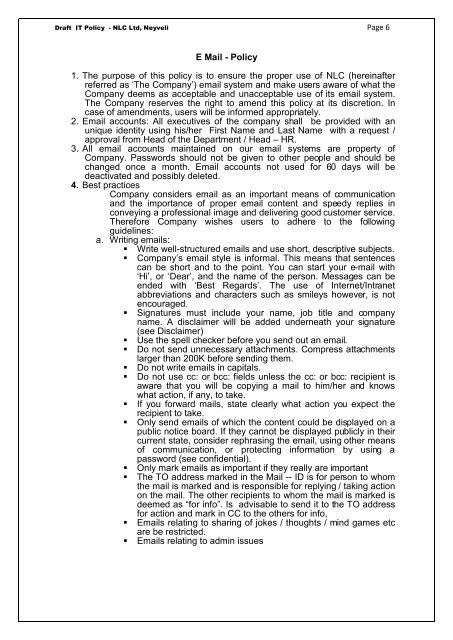NLC - IT Policy 21.5.2015
You also want an ePaper? Increase the reach of your titles
YUMPU automatically turns print PDFs into web optimized ePapers that Google loves.
Draft <strong>IT</strong> <strong>Policy</strong> - <strong>NLC</strong> Ltd, Neyveli Page 6<br />
E Mail - <strong>Policy</strong><br />
1. The purpose of this policy is to ensure the proper use of <strong>NLC</strong> (hereinafter<br />
referred as ‘The Company’) email system and make users aware of what the<br />
Company deems as acceptable and unacceptable use of its email system.<br />
The Company reserves the right to amend this policy at its discretion. In<br />
case of amendments, users will be informed appropriately.<br />
2. Email accounts: All executives of the company shall be provided with an<br />
unique identity using his/her First Name and Last Name with a request /<br />
approval from Head of the Department / Head – HR.<br />
3. All email accounts maintained on our email systems are property of<br />
Company. Passwords should not be given to other people and should be<br />
changed once a month. Email accounts not used for 60 days will be<br />
deactivated and possibly deleted.<br />
4. Best practices<br />
Company considers email as an important means of communication<br />
and the importance of proper email content and speedy replies in<br />
conveying a professional image and delivering good customer service.<br />
Therefore Company wishes users to adhere to the following<br />
guidelines:<br />
a. Writing emails:<br />
<br />
<br />
<br />
<br />
<br />
<br />
<br />
<br />
<br />
<br />
<br />
<br />
<br />
Write well-structured emails and use short, descriptive subjects.<br />
Company’s email style is informal. This means that sentences<br />
can be short and to the point. You can start your e-mail with<br />
‘Hi’, or ‘Dear’, and the name of the person. Messages can be<br />
ended with ‘Best Regards’. The use of Internet/Intranet<br />
abbreviations and characters such as smileys however, is not<br />
encouraged.<br />
Signatures must include your name, job title and company<br />
name. A disclaimer will be added underneath your signature<br />
(see Disclaimer)<br />
Use the spell checker before you send out an email.<br />
Do not send unnecessary attachments. Compress attachments<br />
larger than 200K before sending them.<br />
Do not write emails in capitals.<br />
Do not use cc: or bcc: fields unless the cc: or bcc: recipient is<br />
aware that you will be copying a mail to him/her and knows<br />
what action, if any, to take.<br />
If you forward mails, state clearly what action you expect the<br />
recipient to take.<br />
Only send emails of which the content could be displayed on a<br />
public notice board. If they cannot be displayed publicly in their<br />
current state, consider rephrasing the email, using other means<br />
of communication, or protecting information by using a<br />
password (see confidential).<br />
Only mark emails as important if they really are important<br />
The TO address marked in the Mail -- ID is for person to whom<br />
the mail is marked and is responsible for replying / taking action<br />
on the mail. The other recipients to whom the mail is marked is<br />
deemed as “for info”. Is advisable to send it to the TO address<br />
for action and mark in CC to the others for info,<br />
Emails relating to sharing of jokes / thoughts / mind games etc<br />
are be restricted.<br />
Emails relating to admin issues


